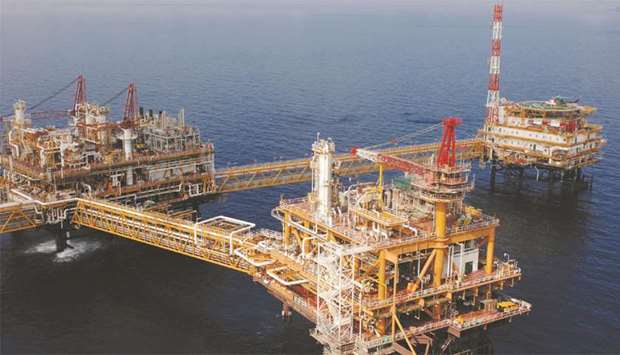Qatar’s General Government Gross Debt as a percentage of the country’s GDP has been estimated to fall to 48% this year and 43.1% in 2021, a new report has shown.
In its recently published economic indicators on Qatar, French multinational investment bank Societe Generale said the country’s general government debt was estimated to have grown to 53.2% of GDP in 2019, from 48.6% a year earlier, as it continued to borrow in international markets.
This, it said, is despite the fact that Qatar's economy started to grow faster after the first quarter of 2019 as government spending rose, particularly with regards to wages in the public sector.
This, Societe Generale noted, helped boost the economy later in the year, which had showed signs of a slowdown as most major infrastructure and construction projects in relation to the World Cup came to completion.
The country’s current account surplus narrowed to 6% of GDP in 2019 from 8.7% a year earlier as global energy prices fell. The surplus is anticipated to narrow to as little as 4.1% in 2020 and 2.7% by 2021 as no short-term recovery is forecast for gas prices or demand in East Asia, bigger receiver of Qatar's LNG.
“However, the commissioning of Barzan natural gas facility this year could support domestic gas production and contribute positively to growth. In the medium term, the expansion of North Field gas projects is expected to be completed by 2024, further boosting gas output,” Societe Generale said.
Qatar has been implementing an economic diversification programme to lower its dependency on the hydrocarbon sector, and in December 2018 the country announced it would leave Opec in January 2019 to focus its efforts on natural gas.
New projects are planned in infrastructure and telecommunications, and various construction projects are in progress in preparation for the World Cup in 2022, it said.
According to Societe Generale, Qatar’s inflation was estimated to have fallen to -0.4% last year from 0.2% in 2018. IMF estimated inflation to rise to 2.2% in 2020 and moderate at 2.1% in 2021 in its latest global economic outlook; however, Qatar has since postponed plans to introduce a VAT to 2021 the earliest, suggesting inflation may continue to remain weak this year.
Like other Gulf countries, Societe Generale said, “Qatar has been hit by the global decline in oil prices since 2014. However, the economic results have been better than that of its neighbours, due to successful economic diversification, namely via the development of large-scale projects.
“The country weathered the diplomatic rift with other Gulf crisis by finding new import and export routes, with its growth rate estimated to have reached 2% in 2019, from 1.5% a year earlier.”
The Qatari economy is projected to grow at a faster rate in 2020-21 (2.8% in 2020 and 3% in 2021) amid an expected boom in the services sector ahead of the FIFA 2022 World Cup, the French multinational investment bank noted.
This, it said, is despite the fact that Qatar's economy started to grow faster after the first quarter of 2019 as government spending rose, particularly with regards to wages in the public sector.
This, Societe Generale noted, helped boost the economy later in the year, which had showed signs of a slowdown as most major infrastructure and construction projects in relation to the World Cup came to completion.
The country’s current account surplus narrowed to 6% of GDP in 2019 from 8.7% a year earlier as global energy prices fell. The surplus is anticipated to narrow to as little as 4.1% in 2020 and 2.7% by 2021 as no short-term recovery is forecast for gas prices or demand in East Asia, bigger receiver of Qatar's LNG.
“However, the commissioning of Barzan natural gas facility this year could support domestic gas production and contribute positively to growth. In the medium term, the expansion of North Field gas projects is expected to be completed by 2024, further boosting gas output,” Societe Generale said.
Qatar has been implementing an economic diversification programme to lower its dependency on the hydrocarbon sector, and in December 2018 the country announced it would leave Opec in January 2019 to focus its efforts on natural gas.
New projects are planned in infrastructure and telecommunications, and various construction projects are in progress in preparation for the World Cup in 2022, it said.
According to Societe Generale, Qatar’s inflation was estimated to have fallen to -0.4% last year from 0.2% in 2018. IMF estimated inflation to rise to 2.2% in 2020 and moderate at 2.1% in 2021 in its latest global economic outlook; however, Qatar has since postponed plans to introduce a VAT to 2021 the earliest, suggesting inflation may continue to remain weak this year.
Like other Gulf countries, Societe Generale said, “Qatar has been hit by the global decline in oil prices since 2014. However, the economic results have been better than that of its neighbours, due to successful economic diversification, namely via the development of large-scale projects.
“The country weathered the diplomatic rift with other Gulf crisis by finding new import and export routes, with its growth rate estimated to have reached 2% in 2019, from 1.5% a year earlier.”
The Qatari economy is projected to grow at a faster rate in 2020-21 (2.8% in 2020 and 3% in 2021) amid an expected boom in the services sector ahead of the FIFA 2022 World Cup, the French multinational investment bank noted.


